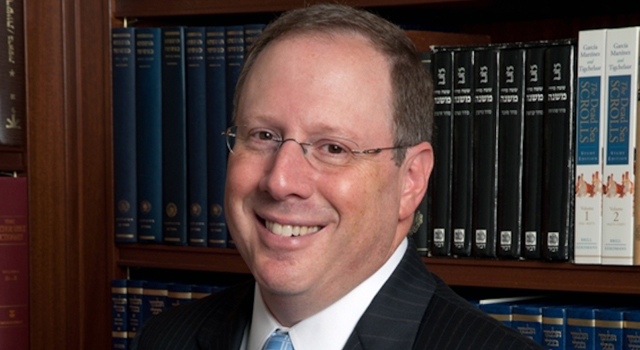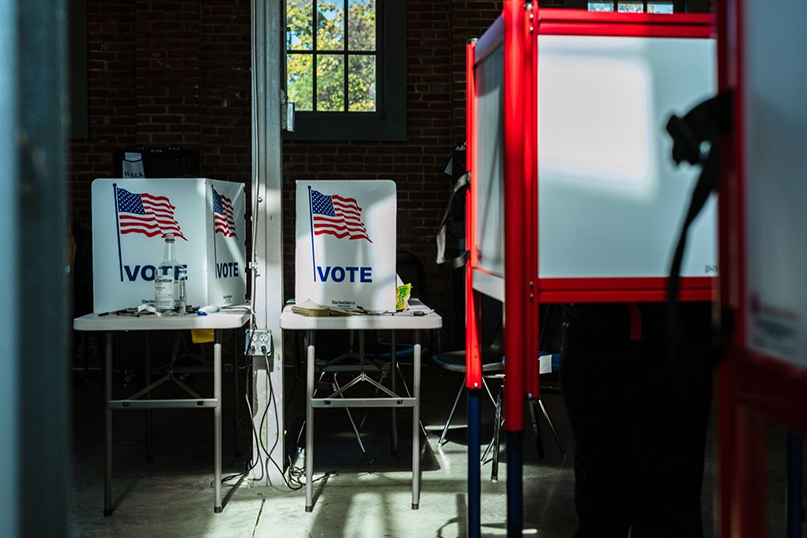
By Ron Kampeas
(JTA) – If you’re in Arizona or Florida and a 585 area code pops up on your phone, you might want to answer: It could be a Jewish volunteer in Rochester, New York, whose mission it is to help you vote.
The Greater Rochester Jewish Federation is one of a number of local and national Jewish organizations endeavoring to make sure eligible voters – Jewish and not – get to the polls.
The organizations are for the most part tax-exempt and by necessity nonpartisan, but the virtual thumbtacks on their maps coincide with battlegrounds where Democrats have pushed back against what they say are Republican efforts to diminish minority turnout.
“The goal is really to register disenfranchised voters, specifically minority communities where access to proper information on voting access, to voter education, all the stuff that you need to be informed, and really to vote in general is really at an all-time low,” said Sarah Walters, the federation’s community relations director.
Volunteers are trained to explain how to safely mail in votes, where President Donald Trump and his associates have sowed distrust in the method through false claims of fraud. They are suing to expand early voting opportunities where Republicans are shutting them down. Where Trump is asking acolytes to watch polls, Jewish groups are training volunteers to de-escalate confrontation at polls. Where Trump says he wants the election called Nov. 3, Jewish organizations are telling voters that a wait is likely because of the coronavirus pandemic.
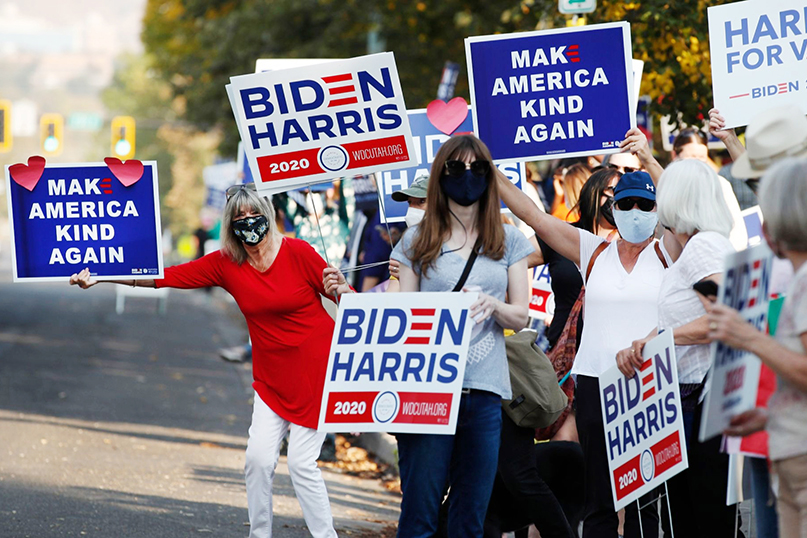
The Jewish Council for Public Affairs (JCPA), the umbrella body for public policy groups, has helped Jewish Community Relations Councils in eight states – Arizona, Florida, Georgia, Michigan, Nevada, Ohio, Pennsylvania and Wisconsin – partner with “All Voting is Local,” a voter registration project run by the Leadership Conference on Civil and Human Rights.
“We’re committed to the protection of people and the right to vote,” she said. “But it’s a fine line to walk this year because of the extreme partisan nature of the landscape.”
Here are some of the protective measures Jewish groups are taking ahead of Election Day.
Registering de-registered voters
Republican-led states have in recent years removed from the rolls voters who have not voted for several successive elections. Democrats and voting rights activists say that because turnout is traditionally lower among minorities and people living in poverty, the action amounts to disenfranchisement. National and local Jewish organizations are partnering with voting rights groups to tell voters in states who may have been stricken off the rolls how to get back on.
The Rochester federation partnered with Reclaim the Vote, a project of Center for Common Ground, a voting rights group. (The Reform movement also has partnered with Reclaim the Vote.) Walters said that 150 Jewish volunteers in her city have trained so far to reach deregistered voters in Alabama, Arizona, Florida, Georgia, Mississippi, North Carolina, South Carolina and Texas.
“You’ve got a script right in front of you that is county-specific and person-specific with all the information they need to figure out if they’re registered,” Walters said. “If they believe that they are registered – in many cases people have registered before but have been removed from voter rolls for not voting enough – you’re making sure that they know how to check that and if they aren’t registered, you’re making sure they have the resources they need to find out that they’re eligible to register.”
Mitigating suppression by increasing turnout
The Religious Action Center of Reform Judaism wants an “overwhelming” turnout, said its director, Rabbi Jonah Pesner.
“It erodes the possibility of the attempts to either delegitimize” the election “or targeted suppression,” Pesner said. “If there is an overwhelming turnout of lower-income communities and communities of color, then that will mitigate against a lot of what will be attempts at voter suppression, like if you close polling places.”
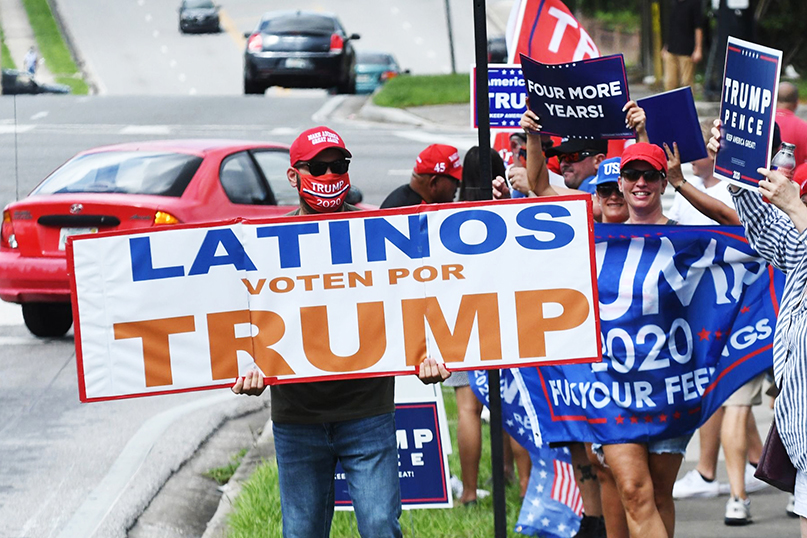
The pandemic means door-knocking is not the option it was in past elections, so Reform volunteers have used electronic means to reach voters, through texting and apps. “We had originally set as our goal 250,000 voter engagements,” Pesner said. “We’ve engaged 350,000 and we’re on track to get to half a million by Election Day.”
The outreach is strategic, Pesner said, citing as an example the RAC chapter in Chicago. Illinois, solidly Democratic, does not pose a disenfranchisement threat, so the local Reform Jewish activists consulted with longtime allies in Black churches. They joined efforts to reach voters in neighboring Wisconsin, which is a critical swing state, and where Republican legislators have sought to inhibit mail-in voting and have limited polling places.
“Knowing that there would be attacks on enfranchisement in the inner city of Milwaukee in particular, this kind of interesting intersectional effort was born between the relationships that pre-existed in Chicago,” he said.
Bringing out the lawyers
Pesner’s RAC is also recruiting lawyers to join a project run by the Lawyers Committee for Civil Rights Under Law to be on call until Election Day to report attempts at voter suppression.
“The hotline has already become almost overwhelmed with calls,” said Pesner.
Sheila Katz, who directs the National Council of Jewish Women, is also recruiting lawyers and others to watch polls.
“We’re working to get people to polling locations that have a particular level of expertise and training to be able to advise people on their rights,” she said. “Lawyers are definitely highly preferred as people we want on the ground. But we have training that will be available to any person who wants to make sure that they’re available to be able to let people know what their rights are.”
Anti-Defamation League lawyers have joined an effort led by Common Cause in Texas to overturn an order by Gov. Greg Abbott to limit ballot drops to one station per county.
Encouraging Election Day volunteering
The Lippman Kanfer Foundation for Living Torah is encouraging Jewish organizations to let staffers take Election Day off to volunteer as poll workers, and providing training for deescalation should they encounter attempts to disrupt voting. It launched its program, called Free and Fair: Our Duty to Democracy, on Oct. 13. Aaron Dorfman, the foundation’s president, said it was working with Over Zero, a group that combats “identity-based violence.” The training involves connecting volunteers from faith communities and establishing lines of communication if there is a threat.
“If there are instances of violence on around Election Day they’re prepared to connect with local law enforcement of elected officials and other faith leaders,” he said. “They can think and strategize together and respond collectively.”
The ADL has published a guide for state and local officials to identify possible sources of extremist violence ahead of time. “It’s a toolkit or reference for state and local officials who are confronting the challenge of the potential for threats motivated by extremism,” said Steve Freeman, the ADL’s vice president for civil rights.
Sending wish-you-were-voting postcards
The Jewish federation in Buffalo, New York, is getting volunteers to write postcards to the voters in the states designated by the Reclaim our Vote project, which cites studies that have found that handwritten appeals on the back of colorful postcards spur 25% of recipients to reregister.
“Every county has specific texts that you’re allowed to use and they handwrite postcards, and they’re given an address to send,” said Mara Koven-Gelman, the federation’s community relations director.
Deborah Cohen, a retired psychiatric nurse who is a congregant at Buffalo’s Congregation Shir Shalom, initiated the postcard writing, drawing in 50 of her fellow congregants. Koven-Gelman said the effort has spread throughout the community.
Addressing challenges facing the young and old
Hillel, the international organization that works with college students and young adults, has revamped its MitzVote campaign for the pandemic era, launching a website that helps students homebound by the pandemic figure out how and where to register to vote.
Two years ago, “West Wing” star and Jewish Twitter celebrity Josh Malina starred in a MitzVote get-out-the-vote video. This year, he’s joined by several other prominent (but youth-oriented) Jews in promoting MitzVote’s “Schmear Campaign,” which aims to convince college-aged voters that casting a ballot during the pandemic is as easy as toasting a bagel. To join the #SchmearCampaign, and make sure your voter registration info is up-to-date, visit http://mitz.vote.
Jewish groups are also giving special attention to elderly voters, as well. Like college students, they may also face unique obstacles in casting their ballots.
“I’m especially concerned that Jews who are sitting at home, who plan on voting, don’t become intimidated because they think there’s going to be rowdy people at the polling sites, that it makes them stay home,” said Ronald Halber, who directs Greater Washington’s Jewish Community Relations Council.
Getting out the party vote
It’s not all about safeguarding the vote. Partisan Jewish organizations are doing what they do every cycle: focusing on getting the vote out, especially in swing states where the margin between the winner and loser is likely to be narrow and Jewish voters could potentially influence the result.
As the contours of the election have become clearer, Democrats are laboring in more states than Republicans.
Matt Brooks, the Republican Jewish Coalition director, said his organization had reached over 410,000 “likely Trump and persuadable” voters in Florida, Pennsylvania, Ohio, Arizona, Georgia and Michigan, all swing states where Jewish voters could make a difference.
Meanwhile, the Jewish Democratic Council of America has made 100,000 calls and sent 120,000 texts to Jewish voters in Arizona, Colorado, Florida, Georgia, Michigan, Minnesota, Nevada, Maine, New Hampshire, Massachusetts, North Carolina, Ohio, Pennsylvania, Virginia and Wisconsin. The hope is to reach 500,000 voters by Election Day.
Bend the Arc, the Jewish social justice movement that has endorsed Joe Biden and other Democrats, has exceeded its target of reaching 250,000 Jewish voters and is now extending its phone and text campaign to non-Jews in swing states, reaching 725,000 so far, said CEO Stosh Cotler. The targeted states include Georgia, Florida, Arizona, Colorado, Michigan, Minnesota, Ohio and Pennsylvania, and the hope is to reach 1.5 million voters by Election Day.
Urging patience, despite possible delays
Efforts to ensure a smooth Election Day and weeks leading up to it may not be enough to safeguard this year’s vote. Jewish groups will join public information campaigns counseling patience in the face of Trump’s stated intention to see the vote as done on the evening of Nov. 3. (Prognosticators have suggested that the count might initially favor Trump and then swing to Biden once mail-in votes are counted.)
“We know that many of the votes won’t be counted on Nov. 3, and perhaps a decision will not be made and we need people to be patient, to let the process happen, we want people to be peaceful,” said Melanie Roth Gorelick, senior vice president at the Jewish Council for Public Affairs.
Election Day violence. Officials worry it could target the Jews.
By Ben Sales
(JTA) – Ryan Greer used to spend his days trying to prevent people from becoming radicalized and joining ISIS.
Now he and several former colleagues who used to work on combating foreign terrorism are paying attention to a threat closer to home: White supremacist violence in the United States. As Election Day nears, Greer sees that threat as growing ever more urgent.
Right-wing extremist groups see the Nov. 3 election as an “apocalyptic moment” where the country’s fate hangs in the balance, Greer says. And he is concerned that Jews may be among the target of groups prepared to take up arms to ensure that Donald Trump wins the election.
“We’re not necessarily predicting that there will be a civil war, but we are very concerned that there will be some violent acts,” said Greer, now the Anti-Defamation League’s director for program assessment and strategy. “As the conspiracy theories become more urgent, many of them may be directed toward Jews.”
Officials that focus on Jewish security believe this election and its aftermath are going to be particularly dangerous for Jews due to a toxic mix of conditions that have been brewing for months. The election is taking place after months of street protests occasionally marked by violence and even vigilante killing. An ongoing pandemic has led to a surge in voting by mail, making it possible the election outcome will remain unknown for days or even weeks. And the president has repeatedly questioned the integrity of the electoral process, refusing to commit to a peaceful transfer of power and initially declining to denounce the white supremacist groups that support him.
“We’re worried about everything from simple tactics to vehicle rammings, which we have continued to see deployed across the country in protests and basic civil gatherings, to active threat events,” said Michael Masters, CEO of the Secure Community Network, which coordinates security for Jewish institutions nationwide. “Among domestic violent extremists, those who are racially and ethnically motivated, specifically white supremacist extremists, remain the most persistent lethal threat in the United States.”
Recent reports from law enforcement agencies confirm this.
The Department of Homeland Security reported this week that white supremacists are the “most persistent and lethal” threat in the United States, noting that such groups are characterized by hatred for Jews. In a threat assessment published last month, New Jersey’s Office of Homeland Security and Preparedness sketched out various scenarios in which a disputed election prompts “racially motivated extremists [to] scapegoat minorities and government officials,” leading to violence and loss of life. A recent report by the Network Contagion Research Institute, which tracks online hate, documented how violent groups in what it calls the “militia-sphere” are using increasingly violent rhetoric – and reaching more people.
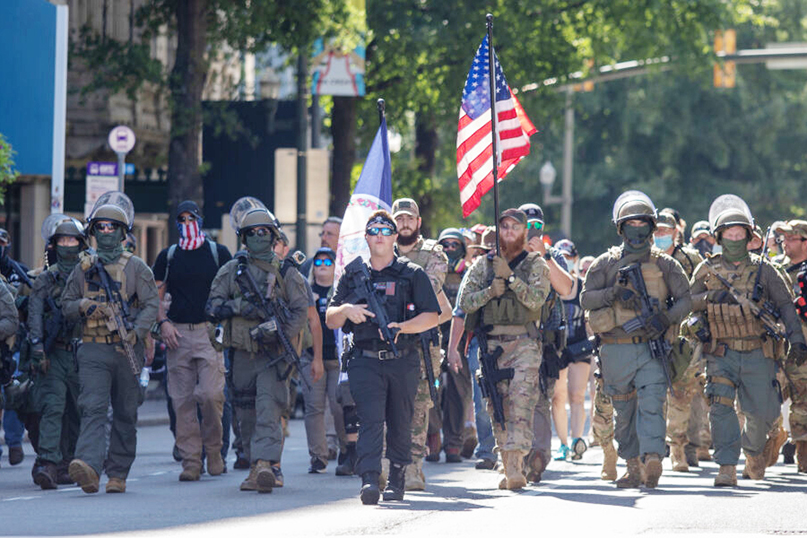
On Oct. 15, the FBI announced charges against a group of antigovernment extremists who had plotted to kidnap Michigan Governor Gretchen Whitmer.
Masters’ organization is currently focused on securing Jewish institutions that serve as polling places or vote counting sites. He estimates that there will be hundreds of polling locations either in or near Jewish institutions, and fears they could become hotspots for extremist violence.
Masters has been focused on synagogue security for years, especially since the Pittsburgh synagogue shooting in 2018. But securing synagogues on Election Day will be especially risky. A large number of unknown people will be entering the building, the doors will likely remain open, and the building may have been unused and unstaffed since March due to the pandemic.
“They may be opening for the first time [since the start of the pandemic], or they may be opening their doors in a way which runs contrary to established security practices and protocols that they’ve adapted over the years,” Masters said. “There can be a compounded threat both because of the concern about the potential for violence around election-related sites, compounded with the fact they are also Jewish institutions and organizations, which may increase their attractiveness as a target for some individuals.”
Cassie Miller, a senior research analyst at the Southern Poverty Law Center, said extremist groups may feel even more empowered to take action after the recent presidential debate in which Trump told the Proud Boys, a violent far-right group, to “stand back and stand by.” Many such groups will accept nothing short of a Trump victory, Miller said, and are prepared to employ violence to ensure that result.
“Within the far-right, there’s been an increasing convergence around the idea that we’re headed towards a civil war or that we’re on the abyss of some large-scale civil unrest,” Miller said. “You’re creating a combustible situation when you have people with guns who feel like they’re acting at the behest of the president and feel like what they’re doing is sanctioned by law enforcement.”
Miller added that while Jews may be at risk, she also fears that communities of color could be in danger, especially in swing states as far-right groups could attempt to suppress their votes.
Greer worries that Election Day violence could produce a snowball effect in which extremists on the left and right clash, leading to lethal shootings as occurred this summer in Kenosha, Wisconsin and Portland, Oregon. Those in turn could inspire more clashes and more shootings. To try to forestall this, the ADL is asking local officials to reassure voters that the election will be fair and to speak out against violence.
The Secure Community Network meanwhile is urging Jewish institutions to monitor entry and exit points and even erect barriers to protect people waiting on line from possible car-ramming attacks.
“It is amazing what you have to consider to allow people to exercise their basic right of enfranchisement in this country in the year 2020,” Masters said.
While Greer is careful to note that extremism exists on both sides of the political divide, he says that far-right political conspiracies have already inspired the murder of Jews in Pittsburgh, a dynamic that could well play out again this year.
“The individual who was the perpetrator was a believer of Jewish religious conspiracy theories related to immigration policy,” said Greer, referring to the Pittsburgh shooter. “That’s a political concern that led to an antisemitic conspiracy theory that led to the largest attack on U.S. soil that was motivated by antisemitism. You can imagine, in the political fallout, when there’s a political crisis, a similar set of conspiracy theories that go specifically after Jews.”
70% of Jews plan to vote Biden, Pew study finds
By Ben Sales
(JTA) – The Jewish vote in the upcoming presidential election should be very close to the way it has been split since 2012, a new study by the Pew Research Center found.
The survey, conducted earlier this month and published Tuesday, found that 70% of American Jews plan to vote for former Vice President Joe Biden, while 27% plan to vote for President Donald Trump.
If those numbers bear out, they will be nearly identical to the Jewish result in 2016, when Pew found that Hillary Clinton won 71% of the Jewish vote to Trump’s 25%. In 2012, the numbers were slightly higher for the Republican candidate: Barack Obama won 69% of the Jewish vote while Mitt Romney won 30%.
The margin of error for Jewish respondents on the Pew survey is quite large, at 9.6%, which means that the result is statistically similar to the Jewish vote in previous elections.
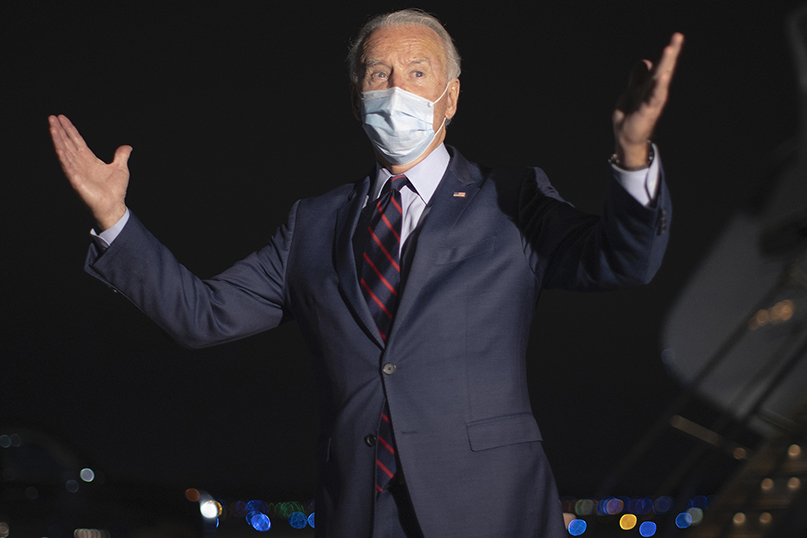
The poll is a blow to Jewish Republican hopes that Trump’s record in office – including recognizing Israeli territorial claims, brokering peace between Israel and two Arab states and pulling out of the Iran nuclear agreement – could shift the vote in his favor.
The Pew poll also found that 35% of Jewish Americans approve of the job Trump has done in office, similar to his 38% approval rating among Americans overall.
Overall, Pew found that 52% of Americans overall prefer Biden while 42% prefer Trump. Large majorities of Jews, Hispanic Catholics, Black Protestants and religiously unaffiliated voters support Biden. Most white Christians, including the vast majority of white evangelicals, support Trump.
Orthodox support for Trump is skyrocketing, survey finds
By Ben Sales
(JTA) – A new poll shows overwhelming support for President Donald Trump among Orthodox Jews.
The poll, published Wednesday by Ami Magazine, found that 83% of Orthodox respondents plan to vote for Trump in the upcoming election, while just 13% plan to vote for Joe Biden. Those numbers represent a dramatic increase from a 2017 poll by the American Jewish Committee which found that 54% of Orthodox Jews had voted for Trump in 2016.
The Ami poll, which was conducted over the past month by an unnamed firm, also found low support among Orthodox Jews for public health restrictions due to COVID-19.
The survey includes 1,000 respondents and has a 3.1% margin of error.
The poll’s numbers put Orthodox Jews politically out of step with American Jews overall, the vast majority of whom oppose Trump and generally vote in large numbers for Democratic candidates. According to a recent survey by the Pew Research Center, only 27% of American Jews plan to vote for Trump, as opposed to 70% for Biden. Those numbers are statistically equivalent to the 71% of Jews who voted for Hillary Clinton over Trump in 2016, according to Pew.
Orthodox Jews have trended right over the past few decades, voting increasingly for Republican presidential candidates starting with George W. Bush. They tend to view Republicans as more pro-Israel than Democrats and accord more with Republican views of religious freedom.
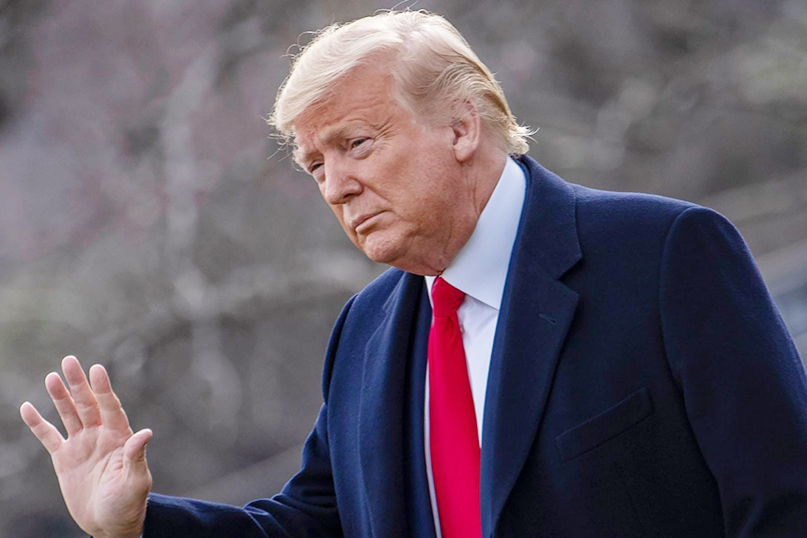
The Ami poll places Orthodox support for Trump at a higher level than any other other religious group in the United States. The Pew survey found that the highest level of support for Trump came from Evangelical Christians, with 78% saying they planned to vote for the president. Pew did not report a result for Orthodox Jews.
The Ami poll also found that haredi, or ultra-Orthodox, Jews are far likelier to vote for Trump than Modern Orthodox Jews. A stunning 95% of haredi Jews said they plan to vote for Trump, as opposed to 56% of Modern Orthodox Jews.
The poll found that Trump has shed some Modern Orthodox support since last year, when Ami found that 70% of Modern Orthodox respondents approved of the job he was doing. The margin of error for Modern Orthodox Jews in the 2020 poll was approximately 4.8%.
The poll also found that Orthodox Jews support public health restrictions aimed at containing COVID-19 far less than Americans as a whole. A majority of Orthodox respondents, 58%, believe that government health regulations are excessive or unnecessary, or that the virus poses no threat at all. Only 32% said that the threat is real and that government guidelines, should be followed, and only 18% of haredi respondents.
While not directly comparable, an August poll shows that a large majority of Americans supports a mask mandate.
The Ami poll was published following days of unrest in Borough Park over recently imposed public heath restrictions aimed at responding to a spike in COVID-19 cases in the heavily Orthodox neighborhood.








 Southern New England Jewish Ledger
Southern New England Jewish Ledger